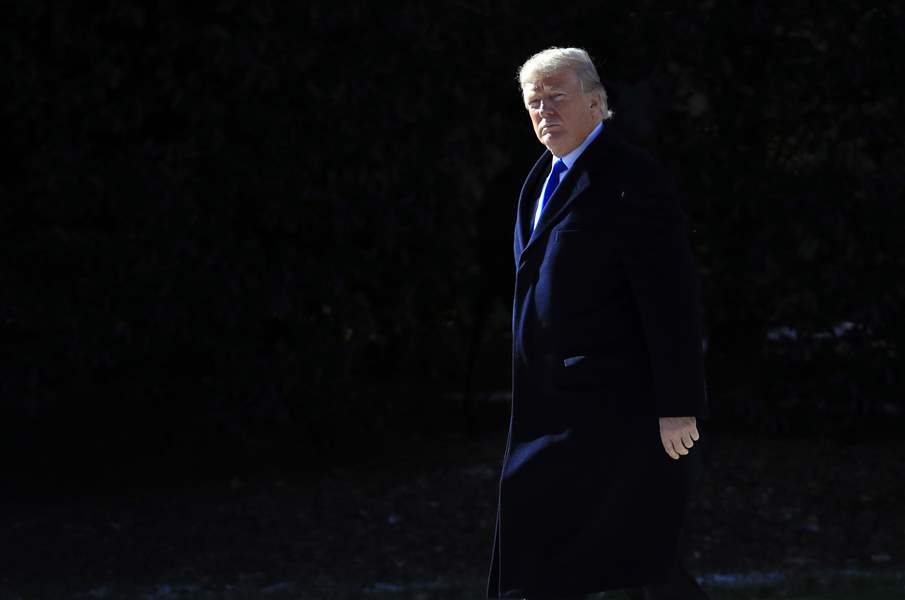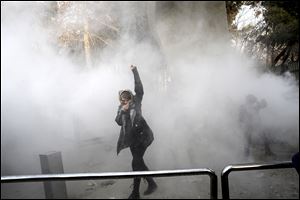
Human rights and national service
1/5/2018

President Donald Trump has a real chance to advocate for human rights, argues Blade editorial page editor Keith C. Burris.
ASSOCIATED PRESS
President Trump is often portrayed by the pundits as two things I think he is not: a mystery and a man without values, without a center.
VIDEO: Liberty is not the enemy of our interests
The President’s unique approach to the presidency and his insistence that he can do serious work and stoke the base at the same time may be a-historical and it may well be unsustainable, but to most Americans it is not a mystery, it’s just Trump.
His values come out in his instinctive responses — like when he called for Americans, and for world opinion, to back the freedom movement in Iran.
That’s what I want my president to say and do: back freedom and human rights.
We have not had an advocate for human rights, as a basis for foreign policy, since Jimmy Carter, who was much maligned for his advocacy. And no presidential candidate since John McCain has argued for American assistance for rebels and freedom fighters in oppressive regimes.
But I think Carter was right in his time and McCain in his.
If we are truly a citadel of liberty, and “a shining city on a hill,” we have to consistently be on the side of people fighting, and often dying, for freedom, be it in Russia, the Ukraine, North Korea, Cuba, China, or Iran.
President Trump is right. The Iranian regime has repressed its people and made them poor. It has sponsored and exported terrorism on the backs of the Iranian people.
The Iranian freedom movement should inspire us. The current spontaneous uprising is broad-based and deep and it is fueled not only by the desire for liberty, but by tremendous physical courage. And we should do all we can to encourage and support it, short of sending troops.
The U.S. should always stand with the seekers of liberty, but we have often not only failed to do that but abetted the tyrants, the worst of the bad guys, either in the name of realism, or because some larger strategic aim was judged more important. In China, we disgracefully turned our backs on the brave young people in Tiananmen Square in 1989, and we have ignored the plight of the Tibetans for three generations.

A university student attends a protest inside Tehran University while a smoke grenade is thrown by anti-riot Iranian police in Tehran, Iran, on Dec. 30.
In Iran, a country with a rich history and a deep culture, the U.S. has consistently chosen the wrong side. In the 1950s we chose the dictator over democracy. That was Eisenhower’s wrong choice. In the late 1970s, under Mr. Carter, we dithered (contrary to his human rights advocacy), failed to help the democrats, and watched haplessly as theocratic fascists took control. And the last time the people of Iran rose up, President Obama kept silent — the reason was the Iran nuclear deal. And that was not much of a deal. It certainly was not worth selling out those who lay down their lives for the founding principles of our own republic — freedom of speech, of thought, of worship and belief, freedom of the press, and due process of law.
The argument against human rights as a basis for policy is that realism and national interest must inevitably trump ideals. But what is realistic about failing to stand up to a Putin or a Castro or a gaggle of ayatollahs?
In truth the strong men and bully boys will cut the same nuclear or trade deals with a principled America as with a wimpy and complicit one. And maybe principle would get us a little better deals. The realism/human rights dichotomy has always been a false one.
Some may find it ironic that Mr. Trump, whose foreign policy mantra has always been “America first,” should be the friend of Iranian rebels. But he has cut through the false dichotomy as Ronald Reagan cut through the nuclear arms doublethink in his day (building up to build down). The President has seen clearly that standing for human rights is putting America first. Think of what a democratic Iran would mean to us. Liberty is not the enemy of our interests, it is the ally.
The second argument made against human rights as a fulcrum for foreign policy is that it will lead to foreign entanglements and suck us into regional and civil wars. That is a fair enough concern. A President McCain might have gotten us into several wars we could not have won. But I propose that a simple check be put in place, one that would make our own society more democratic: Bring back the draft. Institute universal national service for all.
If all of our young men and women were conscripted for one year, all foreign military adventures would be tested in the most telling and fair way possible: Can you support your child going over there?
All Americans 18 to 35 should be required to give the nation a year of service. Those 35 to 65 should be required to give six months in whatever increments they choose over a five-year period.
For our own national integrity and identity we must be that shining city on a hill — the beacon of liberty for all who seek it. And we must be willing to give a portion of our individual lives, fortunes, and sacred honor for the freedoms we cherish and believe should be universal.
Keith C. Burris is editorial page editor of The Blade. Contact him at kburris@theblade.com or 419-724-6266.